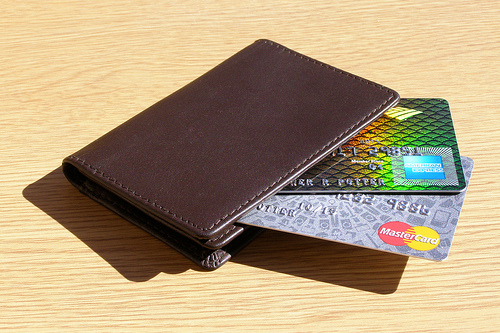
by Adam | Nov 26, 2015 | Credit Repair
Holidays are known to be stressful times with family gatherings, parties, events, high expectations, and extra expenses; and Christmas is no exception. Especially if you are trying to stay debt free this holiday season. Here are some great tips to get you through this year’s festivities debt free! Manage Expectations If you typically spend a lot at Christmas and need to cut way back this year, then you need to set the expectations before the big day. It’s ok to tell your kids and/or family that you are trying to spend less this Christmas. You can make a game out of it with your children by setting a low budget and getting creative with gift giving. You can also tell your extended family that you are trying something new this year and that their gifts may be a little different than in years past. The key is communication upfront so that no one is disappointed on Christmas Day. Give Zero to Low Cost Gifts Oftentimes a sincere handwritten note is much more meaningful than a store bought present. There are so many things you can make, bake, write, or create that don’t cost you anything. Spend time thinking about the individual and their needs, hobbies, and special qualities and it will be easy to come up with a more personal gift this year. Here are just a few examples of low cost gifts you could give: Bake cookies or bread Hand write letters Draw a picture Write a poem Craft something they would enjoy Use What You Have I bet you have plenty of gifts and gifting materials in...

by Adam | Nov 20, 2015 | Credit Repair
As 2015 draws to an end, you likely have had two thoughts cross your mind: you spent way too much on the holidays, and you need to set some New Year’s resolutions to keep your spending on track. With this in mind, take the bull by the horns and decide today to take control of your financial situation by making 2016 the “year of the budget.” As you work toward getting out of debt, repairing your credit, and managing your finances you will likely see improvements in other areas of your life as well. Here are some suggestions for setting financial resolutions for 2016. Stick to the SMART rule The key to accomplishing your goals is setting the right ones from the start. Following the SMART principle of goal setting will make sure you’re set up for success. SMART stands for: S – Specific M – Measurable A – Achievable R – Realistic T – Time-bound Setting the goal of “This year I will get out of debt” doesn’t include a plan or any concrete actions for success. Instead, an example of a SMART goal would be: “I will pay off my credit card by November making monthly payments of at least $50 on the 1st of each month.” This goal is specific – paying off the credit card debt; measurable – with a pre-determined amount to be paid; achievable, assuming that this amount was set after considering other financial responsibilities and factors; realistic because it’s just one credit card as opposed to an entire load of debt, and; time-bound, with the deadline being November. And if paying off...

by Adam | Nov 11, 2015 | Credit Repair
You’ve worked hard to achieve a good credit score and start your own business, so what happens to your credit when you apply for a business loan? How a Business Loan Application Works Obviously, you need a high credit score to secure the best rates and qualify for the loan, but can that business loan application actually lower your credit score? It depends on how the lender decides whether or not to approve the loan. Here are three Ways Your Lender Can Check Your Credit and decide to lend you money: No credit check Soft credit check Hard credit check No Credit Check Some institutions or lenders may not check your credit at all. They may base their decision on other qualifications such as: the length of time you have been in business, your business revenues, and the way you charge and receive payments. If your lender approves you without a credit check it will have no effect whatsoever on your personal credit score. Soft Credit Check Most lending institutions will at least pull a soft credit history report from the bureaus when considering your application. This gives them a good summary of your credit history and a way to judge if you are an ok risk to take. A soft credit check does not hurt your credit score and is not visible to third party lenders that may also check your credit. It will be visible on your personal reports though. Hard Credit Check Once you have been pre-approved, most lenders will then do a hard credit pull (requesting your full credit history reports) before finishing the loan...

by Adam | Nov 2, 2015 | Credit Repair
As a single mother, you have to wear all the hats and juggle multiple roles. This is challenging enough, but if you are suddenly saddled with debt, this can be overwhelming. A good credit score can help you buy a home, go back to school, or buy a car, etc, as well as provide and care for your family. Here are some steps that will help raise your credit score and avoid bankruptcy. 1. Learn the Lingo This may take some research time at first to understand how your credit score works and what all the reports are about, but it is crucial to understand your starting point. Once you understand what your credit score is and what it means, you can move on to actually fixing it. 2. Check Credit Reports Regularly By checking your credit report regularly you will catch mistakes before they get too bad to fix. Once you see a mistake you can take quick action to dispute and correct it before it makes a huge dent in your score. If you can afford to, it may be a good idea to use a credit monitoring service as that can free up some of your time and energy. It may take 3-6 months of hard work to see a shift in your score, but it is worth the effort. 3. Pay Your Bills On Time If you can stay on top of your payments this will put you in good standing with your credit issuer. You may be able to negotiate a smaller payment plan after they know your budget and you can commit to consistent payments. 4. Budget Creating,...

by Adam | Oct 27, 2015 | Credit Repair
Credit card debt can be crippling and hard to get out of. Plus, it can take many years to pay off depending on the amount you owe and how dedicated you are to paying it off quickly. Once you’ve finally paid off the debt, you need to make sure you don’t follow the same path again. Does that mean you should close your credit cards? The answer is that it depends. Take a look at these categories and see which one you fall under to figure out what is best for you and your financial health. Prone to Temptation Do you feel like items at the store are calling your name? Do you have an urge to spend money on things that you don’t need? If you just can’t pass up those new boots, or resist a sale on golf clubs, or you grab everything that looks good in a store, then you may have an appetite for spending. Keeping your credit cards open at this time may be more of a temptation than you can handle and might cause a relapse to your old habits and an accumulation of more debt. For now, it’s probably best to close your cards, start a budget, and examine your spending habits. In Control If you can live on a budget and stick to it, passing by “wants” every time you go to the store, then you’ve got great self-control! Pat yourself on the back. If you are in this category, then you are probably ok to leave your card open and use it responsibly. However, leaving your card open is only...

by Adam | Oct 20, 2015 | Credit Repair
Today it is incredibly hard to graduate from college without any student loans, due to higher tuition rates and less student savings. CNN Money reports that students have an average of four student loans each with an average balance of around $29,000. Graduation brings with it a new stage of life, but how will these loans affect your credit score and your ability to purchase things in the future? Many lenders who extend student loans don’t look into a person’s ability to pay the loan back. “Student loans are the only credit vehicle where a lender continues to extend credit year after year without knowing the person’s ability, or even willingness, to pay,” said Michele Raneri, vice president of analytics at Experian. Ultimately, how your student loans affect your credit score depends on your ability to make payments in a timely manner. However, there’s a little more to it than that – here’s the good and bad news about student loans and your credit. Good News Because your credit score is made up of different types of debt, a student loan can actually be beneficial to your credit score. This type of loan is usually treated as an installment loan by the credit bureaus, which is good news for you as it is weighted less heavily in your overall credit score. Also, since you may not have a long record of credit use when beginning school, a student loan is a great way to start your credit history. And because these loans have an impact on your future and school isn’t considered a luxury purchase, it is fairly easy to obtain...








Recent Comments